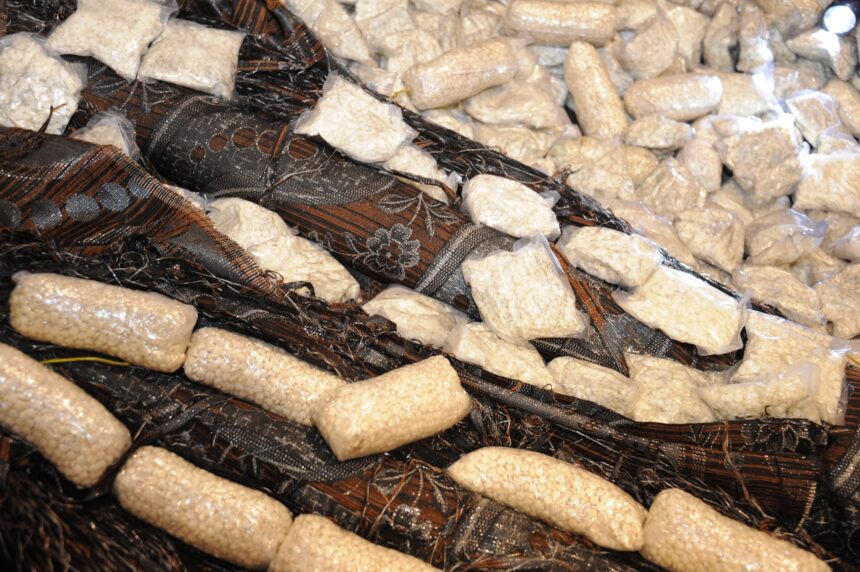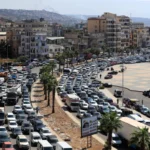Summary by Geopolist | Istanbul Center for Geopolitics:
The report “Drug Trafficking in the Middle East and North Africa” by Caroline Rose offers a comprehensive examination of the dynamics of illicit drug trafficking in the MENA region, which has experienced a substantial increase in recent years. The environment that has been established is conducive to the development of illicit economies, as a result of a variety of factors, such as the overspill of violence, the influence of non-state actors, rampant corruption, and porous borders. The surge in narcotics proliferation is primarily driven by the region’s local production, trafficking networks, and increasing demand for synthetic drugs, as the report underscores.
Captagon as a Major Narcotic in the Area
An amphetamine-type stimulant known as captagon has become the most prevalent illicit substance in the Middle East, particularly in the past seven years. Its trafficking has expanded significantly since the late 2010s and early 2020s, when it was initially observed in lesser quantities in the early 2000s. The regime-controlled territories in Syria and Lebanon’s Qalamoun Mountains are the focal points of the extensive production and trafficking of captagon. The Syrian civil war, Western sanctions, and a deteriorating economy have compelled the Assad regime and affiliated actors, such as Hezbollah and the Fourth Armoured Division, which is headed by Bashar al-Assad’s brother, Maher, to rely on captagon production as a significant source of revenue.
Numerous factors have contributed to the drug’s increasing popularity:
Production feasibility: The synthetic nature of Captagon enables the production of large quantities with minimal scientific expertise and relatively inexpensive materials.
Demand: The substance, which induces feelings of euphoria and invincibility, enhances focus, and prevents hunger, is appealing to a diverse range of users, including affluent individuals, foreign workers, and students. These attributes have significantly enhanced its widespread appeal, particularly in Gulf nations like the United Arab Emirates and Saudi Arabia.
The smuggling routes for captagon are intricate, encompassing both maritime and overland routes. Traffickers have exploited inland storage facilities in Europe and ports in the southern Mediterranean, including Romania’s Port of Constanta and Italy’s Port of Salerno, to smuggle narcotics into the Gulf. Jordanian security forces have intensified border surveillance and operations against trafficking networks, which has resulted in a significant rise in violent clashes along the Jordanian-Syrian frontier. Smugglers who are armed are employed by these networks.
The Emergence of Methamphetamines (“Shabo” or “Shisheh”)
Methamphetamines have experienced a substantial increase in both demand and trafficking throughout the MENA region, in addition to Captagon. In countries such as Jordan and Turkey, law enforcement has reported a surge in methamphetamine seizures, which is indicative of sophisticated clandestine operations and an increase in demand. Traffickers are increasingly employing drones and other methods to convey large quantities of crystal meth, primarily from southern Syria.
Key sources of methamphetamines in the region include Afghanistan and Iran. Despite the Taliban’s 2021 prohibition on the cultivation of ephedra, the growth of meth production in Afghanistan has been facilitated by the discovery of the ephedra plant, a more cost-effective and natural alternative to synthetic ephedrine. Iran is a transit country and a burgeoning center for the production and distribution of methamphetamine, which is trafficked throughout the region and beyond.
Traffickers are particularly drawn to methamphetamines because of their lighter weight, stronger efficacy, and lucrative production process, which necessitates fewer materials and labor than other drugs. The report implies that methamphetamine may soon challenge captagon as the most prevalent substance in the region.
Additional Drugs in the Region: Heroin, Opium, Khat, and Hashish
Traditional narcotics, including hashish, opium, heroin, and khat, continue to play substantial roles in the illicit drug economy of the region, despite the proliferation of synthetic drugs.
Cannabis and hashish: Cannabis is cultivated in the Bekaa Valley of Lebanon and in certain regions of Syria. Hashish is transported through maritime ports to international transshipment centers and through border checkpoints into Iraq, Jordan, and Turkey. Hashish trafficking networks have expanded their operations to include counterfeit currency, tobacco, and illicit weaponry in their consignments.
Khat is a chewable plant that produces amphetamine-like effects. It is a common crop in Yemen, where a significant portion of the cropland is set aside for its cultivation. The substance is transported to markets in India, the Horn of Africa, and the Arab Gulf. Due to the civil conflict in Yemen, khat production has become even more ingrained, as it provides a source of income and taxation for both state and non-state actors, including the Houthi rebels.
Iran is a significant player in the trafficking of opium and heroin due to its proximity to Afghanistan, the world’s largest producer of opium. Despite the Taliban’s prohibition of the Afghan opium trade, these narcotics continue to be transported through Iran and Iraq to major markets in Egypt, the UAE, and other countries.
Key Challenges and Risks
The report delineates several critical challenges and risks that have arisen as a result of the increase in drug trafficking in the region:
Public Health Crisis: The increasing use of synthetic drugs, such as captagon and methamphetamines, presents significant public health hazards, particularly in countries with high youth unemployment, collapsing healthcare systems, and pervasive poverty.
Governance and Rule of Law: The governance and rule of law in the region are undermined by the pervasive corruption and involvement of regime-aligned actors in drug production and trafficking. For instance, in Syria, key military and security actors are directly involved in captagon production, utilizing their control over smuggling routes and checkpoints to facilitate trafficking.
Regional Instability: Criminal actors and militias are increasingly relying on drug trafficking as a source of revenue as the conflict in countries such as Syria, Yemen, and Iraq persists. The region’s instability and violence are further exacerbated by the “crime-conflict nexus” that is formed by the intersection of crime, conflict, and politics.
The report concludes that the Middle East is currently experiencing an escalating crisis due to the continued increase in the production, trafficking, and consumption of illicit drugs, particularly synthetic narcotics such as captagon and methamphetamines. This situation presents substantial hazards to the region’s governance, rule of law, public health, and security. Opportunistic actors are likely to continue to exploit the drug trade for political leverage, battlefield performance, and revenue as the Israel-Hamas war and other conflicts in the region persist.
This changing situation emphasizes the necessity of coordinated regional and international responses to address the increasing menace of drug trafficking and to reduce its impact on public health, security, and governance in the MENA region.
Read more below.







